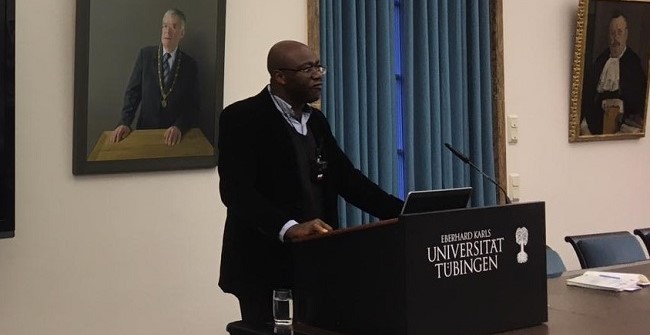Nigeria and the UK have had a troubled history. Nearly a hundred years of resource extraction and colonialism has left its mark on both our countries. Now, Nigeria and the UK are bound by the Commonwealth, an alliance which has been described as a “family” by British Prime Minister Boris Johnson.

One of the things about being a family is you can be honest with each other. That is why, as the UK gets ready to host the crucial COP26 climate change summit a little more than a year from now, it’s time for Nigeria to speak to Britain and tell the truth: Britain is failing on climate leadership and Africa needs you to step up.
Nowhere suffers more from climate change than Africa. Nigeria is suffering from a rise in drought and more extreme weather events. Lake Chad is drying up and, with 70% of Nigerians working primarily in agriculture, huge numbers of people are economically vulnerable to climate change too. The impact, which has been made worse by the COVID-19 pandemic, is clear to see, whether you live in Makoko or, like UK Ambassador Catriona Laing, in the British Embassy.
So why is Nigeria looking to the UK for answers? It’s partly a question of arithmetic: while the UK is one of the bigger emitters in history, Nigeria has emitted just 0.24% of global historic emissions. Yet, our country is already suffering catastrophic consequences from climate change. It’s also because, after a successful bid to lead and host next year’s grand UN convention on climate change, Britain has put itself into the spotlight of a planet that is finally beginning to see the reality of our collapsing ecosystem.
But more than anything, countries like ours are growing nervous because Britain is simply not doing enough. Not even the most silky-tongued ambassador, jolly Prime Minister, or regal Queen can spin their way out of our reality of floods, droughts and conflict caused by climate change.
We are aware that the UK has a pledge to be carbon neutral by 2050, but right now, the UK is failing to rise to the challenge of climate breakdown – and is making some very public missteps.
First, there are the bizarre investment decisions, like the controversial judgement to issue an enormous loan guarantee to a gas pipeline project in Mozambique without a clear plan about the implications for climate change.
Next, as countries around the world proudly unveil investment in renewables technologies, the UK is curiously choosing to open a new coal mine – the dirtiest fossil fuel of them all. Most bizarrely of all, it’s far from clear that Britain will meet its own deadline to submit its plan to cut carbon emissions.
As the world’s balance of power slowly continues to recover from colonialism, Britain needs to hang on to its soft influence as its economic dominance continues to diminish. The UK has much to be proud of – a global reputation for innovation, culture and diplomacy, the mother of all parliaments, and a proudly free press.
But Britain hasn’t yet shown the world that it is willing to use this global influence to tackle climate change. The UK has the ear of global corporations – so why isn’t it doing a better job of getting them to cut their sky-high carbon emissions? The UK has major influence in the G20 and UN – so why isn’t it pushing these bodies to go further, faster in protecting the world from climate change?
The UK has significant influence over countries like the US and Australia, notorious for their weak and slow response to climate change. So why hasn’t it confronted their inaction – and why has it instead appointed former Australian PM, and climate change denier, Tony Abbot, to the UK’s Board of Trade?
It will never be easy or comfortable to stand up to big business or global superpowers. But if its leaders and ambassadors want to protect its images as a global Britain, they must.
The UK continues to be one of the most generous aid donors to less developed countries. But its hard-won political commitment to giving 0.7% of its income away in aid won’t be enough to help countries recover from the catastrophic droughts, floods, crop failures, and fires that will result from climate breakdown.
Instead, Britain needs to stand shoulder to shoulder with less developed countries by driving forward funding to help them become more resilient to the impact of climate change. And it needs to do everything it can to drive financing towards projects that help poorer countries transition to renewable energy – and prevent them from being trapped into permanent reliance on fossil fuels.
Nigerians can look proudly at some of our recent decisions – ourCovid-19 recovery plan that scrapped fossil fuel subsidies and improved access to energy with a major expansion of solar power. It’s decisions like these that allow a country to stand tall and face the world at next year’s climate summit. Will the UK be able to do the same?
Next year, Britain will take on the Presidency of the COP26 summit in its first year out of the European Union. Its leaders say they can prove it is still a global powerhouse – and they’ll be relying on strong trading and diplomatic relationships around the world, including here in Nigeria.
If the UK is to have any hope of maintaining those links, its leaders and ambassadors can’t just talk about climate change. They must actually lead.
By Professor Chukwumerije Okereke
Okereke is the Director of the Centre of Climate Change and Development at Alex Ekwueme Federal University Ndufu-Alike Ebonyi State, Nigeria. He is a Visiting Professor at Oxford University, UK and Coordinating Lead Author for the United Nations’ IPCC
